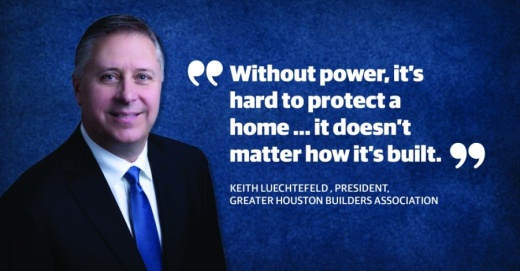According to the GBHA website, the organization represents the residential building industry in 11 counties: Harris, Montgomery, Fort Bend, Brazoria, Waller, Liberty, Wharton, Galveston, Matagorda, Austin and Colorado.
Luechtefeld spoke with Community Impact Newspaper about some of the short-term and long-term repercussions of the storm as well as some of the reasons why so many homes saw burst pipes during the freezing weather.
Are new homes less prone to damage from subfreezing temperatures or winter weather?
The first thing to keep in mind: Without power, it’s hard to protect a home no matter what. ... It doesn’t matter how it’s built. Are homes built today to better withstand almost everything that is thrown at them than they were 20 years ago? The answer is clearly "yes." The envelopes are tighter, the products are more efficient and better for the environment, and they perform better. There have been some changes in plumbing products over the last 20 years. ... Copper isn’t used very much anymore. ... Now, there is a product that is more common called PEX. It is more flexible, and it can adjust to changing temperatures better. That doesn’t solve all the problems, either, but it does improve the performance overall.
What are some problems homeowners see with older homes during extreme weather in the Houston region?
Plumbing is the biggest concern, not just because it leads to cracked pipes but because it gets water everywhere. It’s the most damaging thing to any home. ... You want to keep water where it belongs. That’s the big thing. [It’s] really no question that not having electricity [due to outages] made homes colder than they could have been. I would say probably homes built more recently had more insulation and stayed warmer longer, but given the durations, there was nothing any home could have withstood.
How do you think that recovery from this recent disaster will compare to that seen in the aftermath of Hurricane Harvey?
I’m going to be guessing. ... I don’t think It’s going to be on the scale you saw on Harvey. When [Harvey] hit neighborhoods, it hit entire homes. ... There was water throughout the entire first floor. If [pipe damage] was on an exterior wall, your damage was limited. Most [repairs from the winter storm] will be related to plumbing and some components to electric, sheet rock and insulation when it broke.
Is there short-term or long-term scarcity of plumbing resources or other building materials?
There’s no question about it. Everybody was looking for PVC caps—everybody was looking, and nobody could find them. ... People were waiting in line. ... Forget [larger chain stores]—go to a local plumbing store, and wait in line for several hours to see if you could get one. Right now, from a builder perspective, we think our biggest concern is plumbers, not materials. I think the materials will make their way here more quickly, even, from other regions of the country. That will be a scarcity we have to deal with at least for the short to medium term.
Will last week’s events delay new construction at all?
If there’s no water [damage], it was a delay—nothing more than a delay. We do try to prepare for a broad scope of possibilities, and most of the time, we do a reasonably good job.
What else would you like homeowners to know who have been affected by weather damage?
As hard as it is when you want something fixed in your house that you need—like water—you’re going to have to be a little bit patient. There are only so many resources, and they can only get to so many homes in a day. There are more homes than we’re used to dealing with. As challenging as it may be, people will have to display some patience. The second thing: ... Watch out for scammers. Do your research, and don’t pay upfront. Scammers do exist, so do your due diligence.





